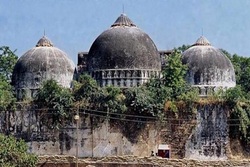Uttar Pradesh Shia Waqf Board Bans Use of Its Properties for Ayodhya Events


Shia Waqf Board chairman Waseem Rizvi, in an order, said no Waqf property, including Imambara, dargah, mosque, mazaar or cemetery, should be used to organize any program on the Ayodhya (Babri Mosque) issue.
He said that violation of the order would lead to action under the Waqf Act and relevant sections of the Indian Penal Code.
The Board said only preordained religious events would be allowed on Waqf properties.
"Use of loudspeakers for sending out any message on Ayodhya issue or calling for any assembly which may lead to disruption of peace will not be allowed. Mutawwalis concerned will be held accountable if peace is disturbed due to such an event," he stated, news18.com website reported.
In the town of Ayodhya, Uttar Pradesh, minority Muslims are feeling under siege as they await a Supreme Court ruling on the centuries-old religious dispute that has cast a shadow over their relations with the majority Hindu community.
After a tangle of legal cases, the Supreme Court in August decided to hear arguments every day in an effort to resolve the dispute over what should be built on the ruins of the 16th-century Babri Mosque (Babri Masjid), destroyed by a Hindu mob in 1992.
The uproar over the mosque triggered some of India’s deadliest riots, in which nearly 2,000 people, most of them Muslim, were killed.
The bloody controversy raised lingering questions about the role of religion in the officially secular country, and the place of Muslims in it.
Last month, Chief Justice Ranjan Gogoi finished the hearings and is expected to pronounce his verdict in the next couple of weeks.
Whichever way it goes, the decision is likely to have a significant impact on the fraught relationship between India’s Hindus and Muslims, who constitute 14% of its 1.3 billion people.



